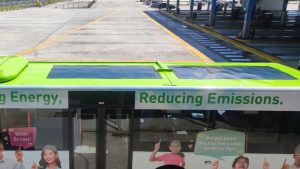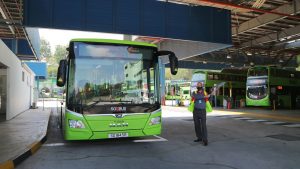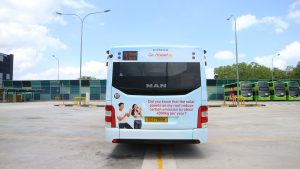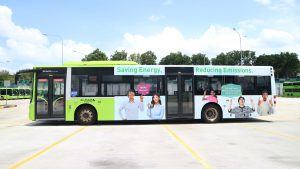On 30 March 2021, Go-Ahead Singapore launched a 6-month proof-of-concept trial for buses with roof-mounted solar panels.
Two MAN A22 (Euro 6) buses received these solar panels, namely SG1798M and SG1843R. Both buses are deployed to Bus Service 15 on a regular basis.


The trial aims to improve vehicle efficiency using these solar panels, thereby consuming less diesel fuel and reducing emissions.
Technical Background
Like all vehicles, buses have an electrical system (typically 24V DC) that provides electrical power to a wide variety of ancillary equipment, such as the doors, interior lights, CCTV cameras, vehicle on-board computer, revenue service equipment, and so forth. This electrical system is coupled to a battery that powers these components while the engine is off.

On a typical internal combustion engine vehicle, a belt-driven alternator is used to convert the mechanical power of a running engine into electrical power. This is used to supply power to the electrical system, and to recharge the batteries.
By using solar panels to supplement the electrical power demands of the bus, less power is drawn from the engine, leading to lower fuel consumption and carbon emissions.
In addition, solar panels allow ‘trickle charging’ of the bus battery, and supplies power to onboard systems that consume energy even while the engine is off. This reduces battery discharge cycles and prolongs the lifespan of the battery.
Solar panel specifications
The solar panels installed appear to be CIGS thin-film solar cells, which are known for being lightweight and flexible, and are well-suited for mounting on vehicles. Two such solar panels are mounted on the roof of the bus, each 1.6-mm thick, and producing a combined 1000 watts.
Solar panels produce DC current, which makes for easy integration with a bus’ 24V DC electric architecture. The entire system weighs less than 20 kg in total, thus contributing minimal additional weight or wind resistance.
The solar installation is supplied by TRAILAR, a UK-based company that sells solar panel kits for a variety of commercial vehicles. In 2019, it fitted solar panels onto 18 buses operated by Go-Ahead subsidiary Bluestar in Southhampton.


Based on Go-Ahead’s Southhampton trials, these solar panels are estimated to help Go-Ahead Singapore save 1,400 litres of diesel per bus per year, which translates to about a 3 to 4 per cent reduction in the typical fuel consumption of the MAN A22 (Euro 6) bus, equivalent to 3.7 tonnes of carbon emissions per bus per year. Fuel savings are expected to be greater in Singapore’s sunnier climate, and Go-Ahead expects to recoup the cost of the trial within four years.
According to TRAILAR, its products use MiaSolé FLEX photovoltaic modules, which deliver >17% cell efficiency. MiaSolé is a leader in thin-film CIGS modules, cells and equipment. In addition, TRAILAR first entered the Singapore market a year prior, having fitted solar panels to 13 waste collection vehicles operated by ALBA W&H in 2020.
Operational matters
Under the Bus Contracting Model, the Land Transport Authority (LTA) owns the buses and leases them to public transport operators such as Go-Ahead Singapore. As such, both Go-Ahead Singapore and LTA collaborated on the solar project.
According to Go-Ahead, the buses underwent rigorous safety assessments by the LTA before being approved for public road trials. The panels will initially be inspected every week for two months, after which the inspection schedule will be reviewed.
As for the bus route, Go-Ahead selected Bus Service 15, a 33 km route from Pasir Ris and looping at Marine Parade, via Tampines and Kaki Bukit, Jalan Eunos and Telok Kurau. The firm had considered conducting the trial on shorter routes such as feeder services but decided on a longer route to better test the system. A BYD K9 electric bus was previously trialled on Service 15 in 2016-2017.
If the trial proves successful, Go-Ahead will consider rolling out solar panels to more buses, including its electric buses.
Special Advertising Wrap
The two solar panel-fitted buses are affixed with a promotional advertising wrap, with messages such as:
- Did You Know That The Solar Panels On My Roof Reduce Carbon Emission By About 4000KG Per Year?
- Singapore’s First Solar Panel Bus!!
- This Bus Has A Solar Panel Fixed On Top!



SBS Transit – Solar Panel Bus
About 10 years ago, solar panels were already fitted on one unit of Volvo B10M Mark IV (Strider), registered as SBS2652G. The bus kept its solar panels until its retirement in August 2015.


The outcome of the trial is not known.
Other Bus Roof-Mounted Initiatives

In May 2019, the Garden On The Move initiative was launched at the inaugural Singapore Garden Festival Horticulture Show. 10 SBS Transit Scania K230UB Buses were fitted with GWS Living Art’s GaiaMat Green Roof System, and deployed on Singapore’s roads for at least three months.
The research study aimed to explore the use of a green roof to reduce heat transmission through vehicular roofs, leading to a reduction in the fuel consumption used for air-conditioning.
Videos:
References
- Ong Ye Kung Facebook Post [Accessed 30 Mar 2021]
- Go-Ahead Buses on track to save over 25,000 litres of diesel this year with our solar technology! – Trialar [Accessed 30 Mar 2021]
- MiaSolé and TRAILAR Unveil Solutions to Global Logistic Green Energy Power Showcase – Trailar [Accessed 30 Mar 2021]
- First public buses with solar panels hit the road in 6-month trial by Go-Ahead Singapore – The Straits Times [Accessed 30 Mar 2021]
- [SBST] (Retired) SBS2652G on Service 105 – Volvo B10M MKIV Strider – YouTube / glitchFan2428 [Accessed 30 Mar 2021]